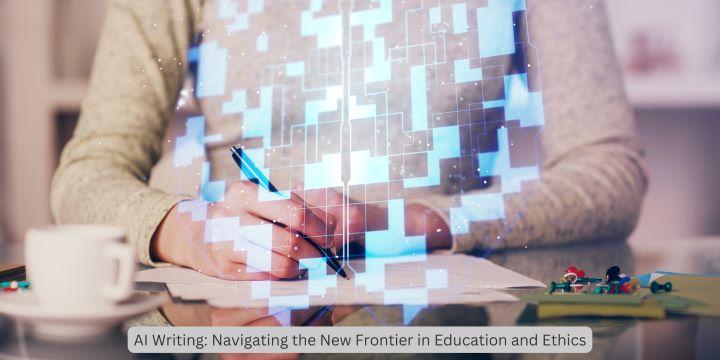AI Writing: Navigating the New Frontier in Education and Ethics
Key Takeaways:
- AI in writing offers benefits and challenges in educational settings.
- Ethical considerations are emerging as AI tools become widespread.
- Understanding AI’s capabilities can help educators and students make informed choices.
AI writing tools rapidly transform the educational landscape, offering students and educators new ways to enhance the learning experience. These technologies, from grammar checkers to advanced essay generators, make writing more accessible, efficient, and tailored to individual needs. However, this new frontier also brings ethical challenges, as concerns about originality, academic integrity, and the role of AI in human creativity come to the forefront. As AI continues to evolve, the education sector must navigate a delicate balance between leveraging these tools for learning while maintaining the core values of critical thinking, creativity, and ethical writing practices. This shift demands thoughtful exploration into how AI can be integrated responsibly into classrooms and academic settings.
Artificial Intelligence (AI) has been steadily advancing, creating profound transformations across various sectors, most notably in how we approach writing. AI writing tools are becoming cornerstone technologies in education, aiding both students and educators to engage differently with the written word. This evolution isn’t just about automating tasks but enhancing how we learn and teach. Besides offering sophisticated AI content detector capabilities, these tools actively reshape educational landscapes, prompting crucial discussions about ethics and the potential over-reliance on technology.
The intersection of technology and creativity offers immense possibilities. However, it also presents significant challenges that cannot be overlooked. As AI integrates into everyday educational activities, stakeholders must consider how best to navigate these new waters, ensuring that the benefits of AI are harnessed effectively while aligning with educational ethics and values. This careful balance is critical in nurturing an environment where technology and human creativity coexist harmoniously.
The Role of AI in Modern Education
AI writing tools have ushered in a transformative era for modern education, characterized by automated feedback mechanisms and highly personalized learning experiences. By leveraging adaptive learning technologies, AI tailors educational content to meet individual students’ unique learning needs and paces. This flexibility levels the academic playing field and ensures students receive a more personalized and practical educational experience.
By automating routine tasks such as grading essays and analyzing student submissions, AI frees educators to devote more time to engaging with students on a more personal and meaningful level. This shift allows for richer student-teacher interactions and contributes to developing a more supportive and holistic educational environment. As these tools become more ingrained in academic processes, the role of teachers may evolve, emphasizing mentorship and guidance over administrative duties.
Benefits of AI Writing Tools in Learning
- AI tools offer rapid and objective feedback on writing assignments, enabling students to promptly identify and work on their weaknesses, thus improving their overall writing skills and critical analysis capabilities.
- AI writing tools are particularly beneficial for non-native English speakers. They provide real-time language corrections and suggestions, helping to improve language proficiency and confidence in using English for academic purposes.
- AI fosters creativity by offering brainstorming tools and features that generate topic ideas, support creative thought processes, and encourage the exploration of new writing styles and formats.
These benefits underscore the importance of incorporating technology into learning environments where the goal is to enhance educational efficacy and accessibility.
Ethical Challenges of AI Writing
Despite AI writing tools’ many advantages, their integration into educational settings is fraught with ethical dilemmas that cannot be ignored. The most important of them is the difficulty of upholding academic integrity in a learning environment that is becoming increasingly AI-driven. Because of the simplicity with which it can produce content, strict rules should be established on how AI should be utilized in academic settings, which raises questions about plagiarism and the validity of student work.
Moreover, the widespread use of AI necessitates robust measures to protect students’ data privacy. AI tools constantly learn and adapt, collecting vast amounts of data that could compromise student privacy if not handled correctly. Educational institutions must develop clear policies and regulations to ensure data security and the ethical deployment of AI technologies. These steps will safeguard user privacy and help build trust among all stakeholders involved.
Balancing AI and Human Creativity
As AI writing tools become increasingly sophisticated, it is imperative to maintain a balance between their capabilities and the essential elements of human creativity and critical thinking. While AI can efficiently handle many tasks, it cannot replace the nuanced creativity and individual judgment that are the hallmarks of human intellect.
Educational institutions are responsible for emphasizing the development of these uniquely human skills. Students can learn to harness AI to enhance their creative output and problem-solving abilities by integrating AI to complement rather than replace human input. This approach fosters a learning environment where AI is perceived as an ally in creativity, providing a platform for students to explore their potential while benefiting from technological advancements.
Future Outlook: AI Writing and Education
The future of AI in writing is robust, with myriad possibilities on the horizon. As AI technology evolves, we can anticipate groundbreaking innovations that will deepen its role in education, making learning more engaging, personalized, and efficient.
However, these advancements have enduring challenges concerning ethics, equity, and accessibility. Educators, technologists, and policymakers must work collaboratively to address these challenges and responsibly shape the future landscape of AI in education.
Final Thoughts
AI is undeniably reshaping the educational landscape, offering unprecedented opportunities for innovation and enhancement. By maintaining a balanced perspective, educators can ensure that these tools are integrated ethically and effectively, ultimately enriching the learning experience for all involved.
Engaging responsibly with AI is key to unlocking its full potential while preserving the unique human qualities that define education. As we continue navigating this new frontier, fostering a collaborative, ethical, and forward-thinking approach will be essential to realize AI’s promise as a powerful educational ally.














